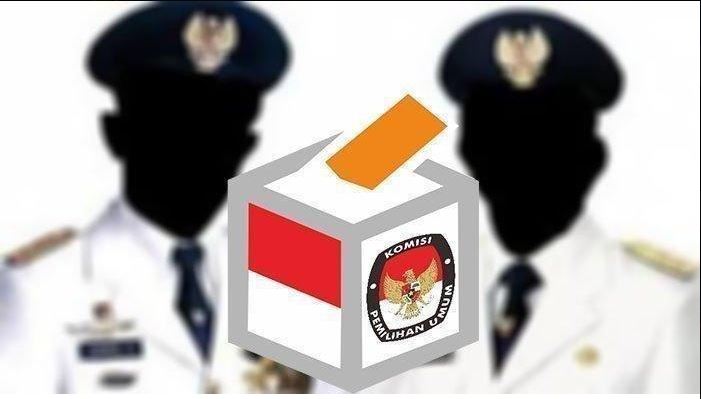
Anies Baswedan bersama para ulama. Foto diambil dari www.suara.com
STRATEGIC ASSESSMENT. Presidential candidate Ganjar Pranowo said he and his running mate, Mahfud MD, will be fully committed to taking out corruption if elected. During his presidential campaign in Kendari, Southeast Sulawesi, Ganjar said one of his supporters asked him to remove corruption, collusion and nepotism.
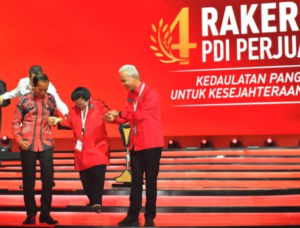
Presidential candidate Prabowo Subianto and running mate Gibran Rakabuming Raka have made access to clean water and sanitation a primary focus in their campaign, recognizing these as fundamental human needs.
Vice presidential candidate Muhaimin Iskandar a.k.a. Cak Imin said his team wished to bring about change with equality in several regions. Imin mentioned Papua’s natural resources, which actually benefit the United States. He seeks equal justice in that location.
Presidential candidate Anies Baswedan planned to reduce the cost of hajj if he is elected president for the 2024–2029 period. Not only that, Anies also plans to increase the quota of pilgrims from Indonesia to 20,000.
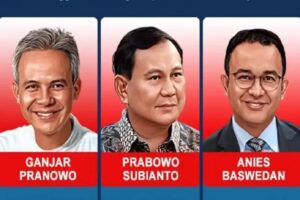
Anies Baswedan-Muhaimin Iskandar campaign team spokesperson Tatak Ujiyati has denied reports that presidential candidate Anies explicitly opposes the Nusantara Capital City (IKN) megaproject, a claim made by National Mandate Party (PAN) vice chairman Viva Yoga Mauladi. Tatak argued that the president elected in the 2024 election would have no choice but to go through with Nusantara as the House of Representatives had passed a law on it. According to Tatak, Anies merely took a critical stance toward the IKN to improve it.
Presidential candidate Anies Baswedan during a campaign event at Pancing Sports Hall in Deli Serdang, North Sumatra promised that he would form a special team to reduce the price of goods if he won next year. The former Jakarta governor also promised a special program to develop public transportation in Medan that would rival Jakarta’s transit system. At the same event, Anies also expressed his concern over a potential for security forces, the General Elections Commission (KPU) and the Elections Supervisory Agency (Bawaslu) to lean toward supporting certain candidates in the 2024 election, and urged these institutions to uphold neutrality.
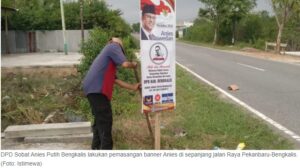
Answering to a question on the acceleration of the green economy in the mining industry, Presidential candidate Anies Baswedan said the state must oblige the mining industry to employ renewable methods in its operation. Anies Baswedan said that if elected, he would demand the realization of the said green methods.
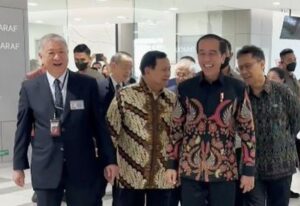
Presidential candidate Prabowo Subianto was expressed hope that Indonesia could become a reliable car producer during a speech to 2,000 preachers in Lebak, Banten. Prabowo said the initial success in pioneering the production of an Indonesian-made jeep was the stepping stone to further developing the automotive industry in Indonesia. He claimed that the vehicle, named the Maung, was 73 percent comprised of local components.
Presidential candidate Ganjar Pranowo received many aspirations during the campaign in Eastern Indonesia, one of which was the lack of access to health services related to health facilities and health workers. Responding to these aspirations, Ganjar-Mahfud National Winning Team Director Roby Muhamad said that the pair had prepared programs to provide health facilities and personnel in all villages.

The pressure is on for KPU to be decisive about its hosting of the official 2024 election debates, amid a lack of clarity over the format and low trust in the commission’s perceived neutrality. Some seventy days before one of the world’s biggest single-day elections commences in Indonesia, voters are keen to follow the five scheduled televised debates to form their opinion of who to vote for next year.
However, concerns have arisen among some election candidates and election watchdogs, after KPU chief Hasyim Asy’ari announced abrupt changes to the debate’s format, potentially contravening existing regulations.
The General Election Commission (KPU) decided that the presidential and vice presidential candidates will take the stage together in five debates during the 2024 presidential election campaign period. However, KPU Chair Hasyim Asy’ari emphasized that if the accompanying presidential candidate or vice president was speaking at the debate at the time, the other one should not speak. Because the KPU has decided how much time each candidate will spend debating, he claimed, with three presidential debates and two vice presidential debates. Hashim, on the other hand, is unconcerned if each partner discusses before responding during the debate, as long as the person speaking sticks to his schedule.
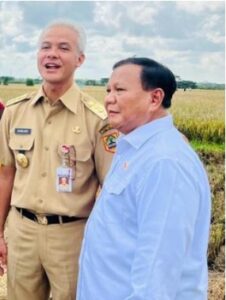
Former Central Java governor Ganjar Pranowo and Defense Minister Prabowo Subianto will continue President Joko Widodo’s industry downstreaming strategy if they win next year’s presidential election, while former Jakarta governor Anies Baswedan will likely “recalibrate” the scheme if chosen, their campaign teams have said. Concern over industrial downstreaming’s impact on the climate, however, has become a unanimous worry.
At a discussion at the Centre for Strategic and International Studies (CSIS) in Jakarta, speakers from each of the candidates’ campaign teams shared the views of their aspiring presidents on industrial downstreaming, with Anies’ team the only one that seemed cold on continuing the Jokowi-style scheme.
The House of Representatives officially proposed a Jakarta Special Region Bill that stipulates that the city governor and deputy governor will be appointed by the president after the capital city is moved to the new capital of Nusantara or IKN. The decision to make the Jakarta Special Region Bill an initiative proposal from the House was made at a plenary meeting at the Parliament Complex, Jakarta. Only the Prosperous Justice Party (PKS) faction of the House’s nine factions opposed the bill.
Angus Lam, research intern with the Southeast Asia Program at the Center for Strategic and International Studies in Washington, D.C said starts off without the introductory sentences??? The Prabowo of late, however, has been described as a different kind of politician. He shed his image as a “modern-day warrior” (pendekar) and positioned himself as a “patriot ready to serve his people” (pengabdi) and a “keen student and follower” of Jokowi’s leadership style. He has traded his usually divisive rhetoric and behavior for more inclusive and forgiving messaging. Rather than dismiss his political rivals as immoral or corrupt, he has instead heaped effusive praise and made highly-publicized and choreographed “political courtesy visits” (silaturahmi politik).

Prabowo continues to be well ahead in polls even as running mate Gibran has been criticized over a range of issues, not least his propensity for blunders. Analysts say Indonesian voters see the pairing as remaining just “like Jokowi’s era,” while Prabowo benefits from his rival Ganjar’s lack of branding.
In response to the recent issues of his absence from the presidential and vice presidential debates organized by other parties, Vice presidential candidate Gibran Rakabuming Raka said he’ll be coming to official debates. Gibran did not elaborate on his reasons for not accepting the public debate invitations.
The head of the regional campaign team (TKD) for Prabowo Subianto and Gibran Rakabuming Raka in West Java, Ridwan Kamil, expressed his desire to use social media to promote the candidate pair’s ideas. Ridwan said the younger generation in West Java would prefer a relaxed and easily understandable campaign style rather than complex explanations.
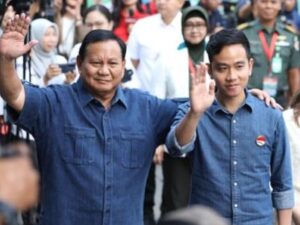
The Prabowo Subianto -Gibran Rakabuming Raka campaign spokesperson Arief Rosyid Hasan said the candidate pair would resume President Jokowi’s health service transformation policies if they won the 2024 election.
Presidential candidate Ganjar Pranowo visited the Nusantara capital city or IKN project in East Kalimantan, expressed his commitment to carry on with its development if he’s elected in the 2024 general elections. Presidential candidate Ganjar Pranowo promised to commit to reducing extractive industries in East Kalimantan, during his campaign in Balikpapan, East Kalimantan. He asserted that environmentally friendly green energy should be used to replace the industry’s current energy demand.
Gerakan Rakyat, the volunteer organization supporting the presidential and vice presidential candidate pair Anies Baswedan and Muhaimin Iskandar , said that it would focus on strengthening the campaign’s Java network for the next 10 days.
The General Elections Commission (KPU) has floated the idea of allowing YouTube personalities and content creators to serve as moderators in the upcoming official presidential debates sanctioned by the poll body. KPU Chair Hasyim Asy’ari said moderators for the presidential debates should be personalities known by the public and social media personalities and content creators could easily meet that criteria.
With less than a year left in office and campaign activities for next year’s presidential election in full swing, President Jokowi has made a series of visits to eastern Indonesia that critics say show an inability to keep an appropriate distance from electoral politics. Speaking to reporters, Jokowi dismissed suggestions that he had intentionally made visits to East Nusa Tenggara (NTT) and Papua to shadow presidential candidate Ganjar Pranowo, rival to Prabowo, who made campaign stops in the two provinces in the past week.
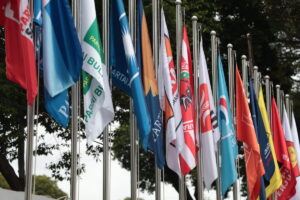
Burhanuddin Muhtadi, a Visiting Fellow of ISEAS – Yusof Ishak Institute and Associate Professor at State Islamic University, Jakarta and Kennedy Muslim, a Senior Researcher at Indikator Politik Indonesia said the decision of the coalition of parties supporting Prabowo Subianto (Gerindra, Golkar, Demokrat, PAN and others) made on October 22 to advance Gibran Rakabuming Raka, the son of President Jokowi, as Prabowo’s running mate is an electoral gamble that has captured much media attention. The dramatic process at the Constitutional Court (Mahkamah Konstitusi or MK), which issued its ruling to pave the way for Gibran to run as a vice-presidential candidate has created controversy. The MK ruling triggered nationwide criticism on TV and social media, and the Indonesian Democratic Party of Struggle (PDIP) alleged that there was intervention by powerful actors to influence MK’s decision. This storm of criticisms led the Constitutional Court Honorary Assembly (MKMK) to dismiss Anwar Usman, President Jokowi’s brother-in-law, from his position as the Chief Justice of MK.
Indonesian defence minister and presidential hopeful Prabowo Subianto has extended a commanding lead in the polls ahead of February’s election, with a series of recent surveys showing the former general now has a more than 20-point lead. The latest poll, released by Kompas showed that Prabowo and his running mate, President Joko Widodo’s 36-year-old son Gibran Rakabuming, garnered 39.3% of the vote.
From promising to cut costs of pilgrimage to Mecca to giving schools free milk, Indonesian presidential candidates are stepping up their populist games on the campaign trail.
Since the official campaign period started on Nov. 28 for the presidential vote in February, former Central Java Governor Ganjar Pranowo, 55, and former Jakarta Governor Anies Baswedan, 54, have been criss-crossing the country to meet students, fishermen, vendors at wet markets, and many more. Defence Minister Prabowo Subianto, 72, the only one still actively serving in the government, has so far only visited West Sumatra in addition to regions not far from Jakarta.
Edward Aspinall, a Professor of Politics and Head of the Department of Political and Social Change at the Coral Bell School of Asia Pacific Affairs, the Australian National University said as Indonesian President Joko ‘Jokowi’ Widodo’s term comes to an end, Indonesia’s democratic decline is accelerating, as the country prepares for the presidential elections in 2024 — the fifth since the end of authoritarian rule in 1998. The major political mystery of the year — which candidate would Jokowi back — was resolved definitively in mid-October when Indonesia’s Constitutional Court opened the way for Jokowi’s 36-year-old son, Gibran Rakabuming Raka, to stand as the running mate of Defence Minister Prabowo Subianto. As well as setting up a dynastic succession of sorts, the pairing of Gibran with Prabowo is the culmination of a political reconciliation between once political rivals, Jokowi and Prabowo. More importantly, the decision brings into sharp focus the weakening of core democratic institutions under Jokowi’s presidency. When Jokowi spurned Ganjar Pranowo, the candidate of his own party, PDI-P, in favour of a ticket uniting Gibran with Prabowo, it was a sign of both the tightening grip of dynasties on Indonesian political life and the weakening of political parties.





